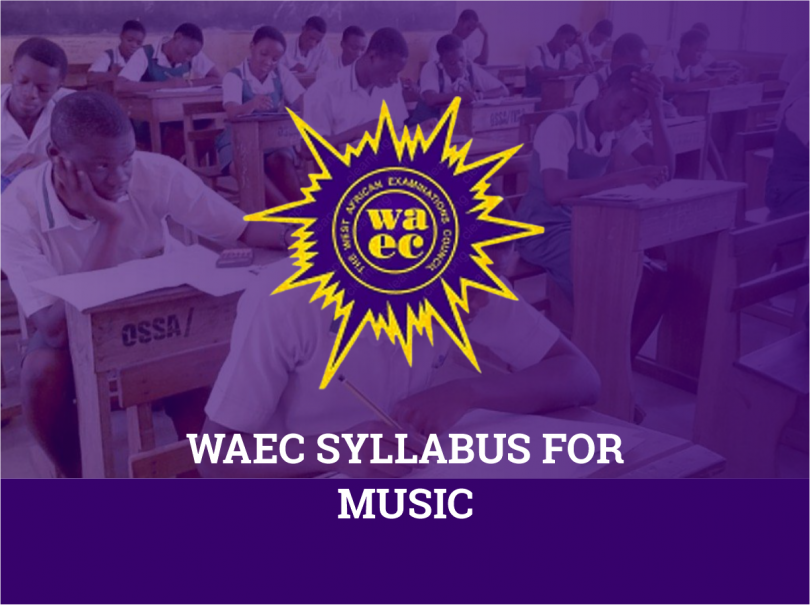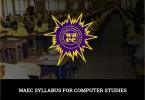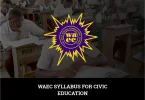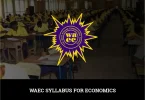When you think of WAEC, “Music” probably is not the first subject that comes to mind. Music in WAEC 2026 is not just about playing instruments or singing in key, but understanding how music works, where it comes from, and how to talk about it like a pro. Knowing what the WAEC syllabus expects is your first step to success.
To pass the music exam for WAEC, you will need to know and understand the WAEC Syllabus for Music, even if you are not a music genius. The information in this article will show you everything you need to know about the WAEC Syllabus for Music for 2026.
This article will help candidates who wish to write music in WAEC to understand the language of music, how it moves people, tells stories, and connects cultures. Study this syllabus carefully to succeed!
WAEC Syllabus for Music
The following are what is included in the WAEC Music Syllabus for 2025:
Theory of Music
First things, students need to learn how to “read” music the same way they would read a book. They need to study the following key areas:
- Music Symbols
- Scales
- Intervals
- Chords & Harmony
- Rhythm
Practical Music
This part is all about your performance if you sing, play an instrument, or both. Key areas they will be judged on are:
- Instrument Playing: You will choose an instrument (like piano, violin, guitar, or drums) and perform a set piece.
- Singing: If you are a vocalist, you will need to demonstrate breath control, pitch accuracy, and vocal tone.
- Sight-Reading: You will be asked to play or sing a piece you haven’t seen before.
- Musical Expression: It is not just about getting the notes right but about feeling the music and delivering it with emotion.
Musical Forms and Styles
Every type of music has a “blueprint”; in this section, Students will learn how different songs and compositions are structured. You need to study the following key areas:
- Classical Music Forms: Like the sonata, rondo, and variation form.
- Popular Music Structures: Verse-chorus forms in genres like pop, hip hop, reggae, and rock.
- Traditional African Music: Rhythms, instruments, and vocal techniques unique to African culture.
- Global Music: Learn how Western and African music connect and influence each other.
Music History
Students will dive into how music has changed over time, from ancient sounds to modern hits. Topics Include:
- Western Music History: Explore the Baroque, Classical, Romantic, and Modern periods.
- African Music Heritage: Learn about African musical roots, traditional instruments, and how music fits into everyday life.
- The Power of Music in Society: Understand how music reacts to culture, politics, and social change.
Music Technology
WAEC Music includes tech, and you will learn about the tools and software used to create and produce modern music. Key areas are:
- Notation Software: Like Sibelius and Finale for writing music digitally.
- DAWs (Digital Audio Workstations): Programs like Logic Pro, FL Studio, or GarageBand for producing and recording.
- Recording Basics: Microphones, mixing, editing, and how it all works.
- Electronic Music Tools: Synthesizers and electronic beats.
Aural Skills
In this section, you will train your ears to recognize and understand music just by listening. You will need to study the following:
- Recognizing Intervals: How far apart two notes sound.
- Identifying Rhythms and Melodies: Writing down what you hear.
- Hearing Harmonies: Being able to pick out chords by ear.
- Analyzing Music: Listening and figuring out how a piece is structured and played.
WAEC Music Exam Structure
In the WAEC exams, you will face three types of papers, which include:
- Paper 1: All about theory and aural skills, written questions on reading music, harmony, and listening.
- Paper 2: Practical test, performance (instrument or voice), sight-reading, and interpretation.
- Paper 3: An extended written paper focusing on music history, analysis, and essays.
Conclusion
Music as a WAEC subject goes far beyond just playing an instrument or singing. It’s about understanding the full world of music, its structure, history, emotion, and even the tech behind it. With consistent effort, smart studying, and a love for sound, you will not only pass the exam but also become a better musician.
We hope you found this article about the WAEC Syllabus for Music helpful. To succeed in WAEC Music, make daily practice a habit, focus on reading and writing music, explore various music genres, and use apps to sharpen your listening skills. Watching tutorials and performing in front of others will boost your confidence and deepen your understanding. For further inquiries, visit the comment box or the official WAEC webpage!







Leave a Comment